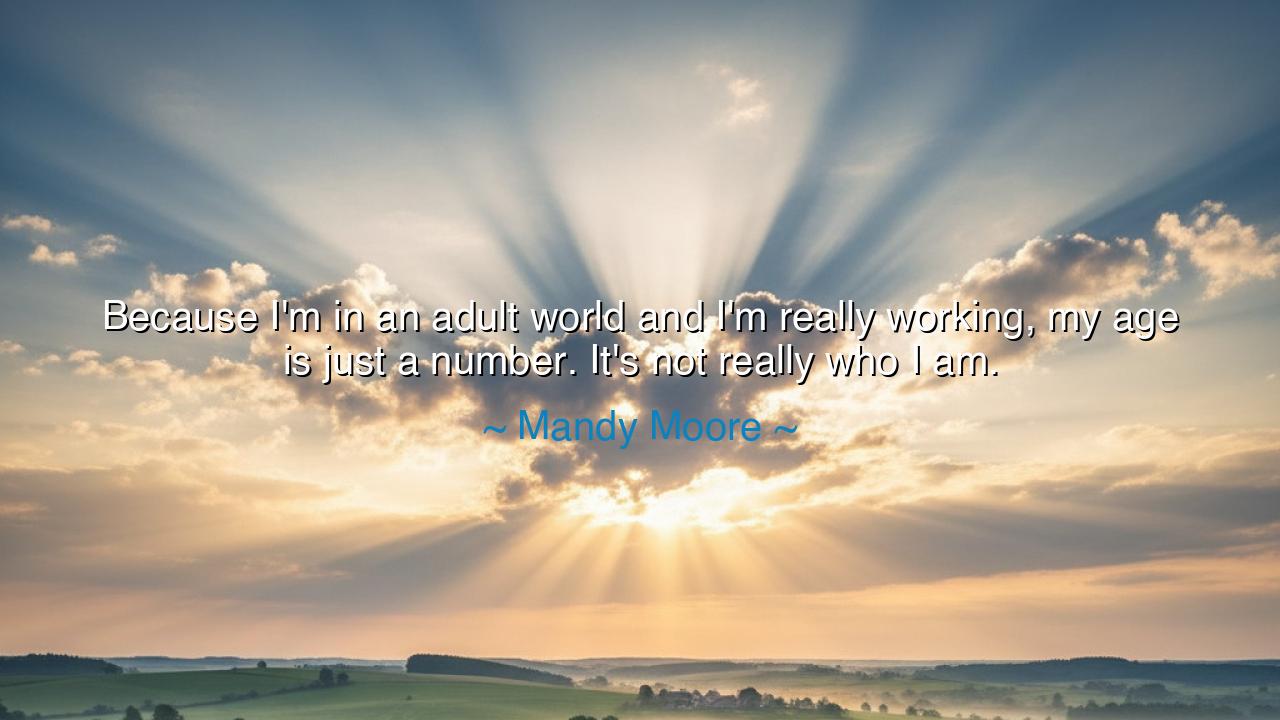
Because I'm in an adult world and I'm really working, my age is
Because I'm in an adult world and I'm really working, my age is just a number. It's not really who I am.






"Because I'm in an adult world and I'm really working, my age is just a number. It's not really who I am." – Mandy Moore
In the vast narrative of life, there comes a realization—a profound understanding—that our age is but a measure of time, not the true essence of who we are. Mandy Moore, in her words, speaks to the universal truth that identity is shaped not by the years we accumulate, but by the work we do, the choices we make, and the life we create. Age, in this context, becomes a mere marker of physical existence, while the true measure of a person lies in their purpose, strength, and spirit. It is a call to look beyond surface-level perceptions and to embrace the idea that we are not defined by our age, but by how we live in the present and the actions we take.
This timeless wisdom echoes in the ancient Greek concept of arete, the pursuit of excellence through virtue and personal effort. For the Greeks, a person’s worth was not determined by the number of years they had lived, but by their character and the contributions they made to society. Socrates, though an old man when he became famous, was revered not for his age, but for his wisdom, his unrelenting pursuit of knowledge, and his courage to question everything. His very life showed that identity is something forged through action, and not determined by the passage of time. Similarly, Mandy Moore’s reflection on age reminds us that greatness is found in the work we do and the person we choose to become, not in the years that pass us by.
The Romans, too, had their own version of this truth. Cicero, the great Roman orator, spoke of senectus (old age), but his view was that the true value of a person is determined by the pursuit of wisdom and duty to the state, rather than by the number of years they had lived. Cicero’s legacy is not tied to his age, but to the ideas he championed and the philosophy he left behind. Like Cicero, Moore understands that age is not the defining factor; it is the quality of our work and the impact we leave on the world that shapes who we are.
This recognition of the irrelevance of age in the face of one’s purpose is also found in the life of Leonardo da Vinci, who, despite being an old man when he completed some of his most groundbreaking works, never saw his age as a limitation. He continued to work, to innovate, and to push the boundaries of art and science until his final days. Da Vinci’s legacy stands as a testament to the idea that a person is not limited by the physical constraints of age but is instead defined by their passion, dedication, and creative spirit. Similarly, Moore’s words remind us that who we are is not confined to the years we live, but to how we engage with the world around us and the meaning we create through our efforts.
The ancient Stoics, particularly Epictetus, held that we must define ourselves by our actions, not by external circumstances, such as age. Epictetus taught that inner freedom and strength come not from the passing of time but from choice—the choice to live virtuously and with purpose, regardless of external factors. Age, for the Stoics, was merely another part of life’s flow, something to be accepted with grace and dignity, but not something that would dictate one’s capacity or potential. In the same way, Moore’s perspective is a call to reject the limiting belief that age is a barrier to success or fulfillment. Her life and work reflect a modern-day Stoic wisdom: that identity is found in action and purpose, not in how many years one has lived.
The lesson to be drawn from Moore’s words is one of empowerment and self-definition. We must not allow the world to tell us what we can or cannot do based on our age or stage in life. Age is merely a number, and while it brings experience and wisdom, it does not limit our potential or our capacity to achieve. Just as the ancients understood that a person’s true essence lies in their choices, so too must we embrace the freedom to shape our own identity by how we choose to engage with the world.
In practical terms, this means that we must focus on the present, on the work we are doing, and the lives we are creating for ourselves and others. Whether young or old, we must define ourselves by what we contribute, not by how many years we have lived. Let us take action, pursue purpose, and leave a legacy that speaks to who we are at our core—not the number of years we have existed, but the life we have lived. Age does not define us; our spirit, passion, and effort do. And in this, we find true freedom.






AAdministratorAdministrator
Welcome, honored guests. Please leave a comment, we will respond soon